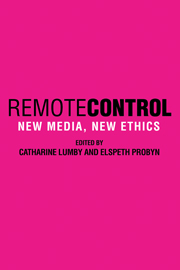Book contents
- Frontmatter
- Contents
- List of Contributors
- Acknowledgements
- 1 Introduction: An Ethics of Engagement
- 2 Real Appeal: The Ethics of Reality TV
- 3 Arguing about Ethics
- 4 ‘Their own media in their own language’
- Beyond the Disconnect: Practical Ethics
- 5 A Viable Ethics: Journalists and the ‘Ethnic Question’
- 6 Ethics, Entertainment and the Tabloid: The Case of Talkback Radio in Australia
- Money versus Ethics
- 7 Eating into Ethics: Passion, Food and Journalism
- Beyond Food Porn
- 8 Ethics impossible? Advertising and the Infomercial
- Pitching to the ‘Tribes’: New Ad Techniques
- 9 Diary of a Webdiarist: Ethics Goes Online
- 10 Control-SHIFT: Censorship and the Internet
- Representing the Asylum Seekers
- 11 The Ethics of Porn on the Net
- Ethics and Sex
- 12 Grassroots Ethics: The Case of Souths versus News Corporation
- 13 Great Pretenders: Ethics and the Rise of Pranksterism
- The Limits of Satire
- Index
Ethics and Sex
Published online by Cambridge University Press: 18 December 2009
- Frontmatter
- Contents
- List of Contributors
- Acknowledgements
- 1 Introduction: An Ethics of Engagement
- 2 Real Appeal: The Ethics of Reality TV
- 3 Arguing about Ethics
- 4 ‘Their own media in their own language’
- Beyond the Disconnect: Practical Ethics
- 5 A Viable Ethics: Journalists and the ‘Ethnic Question’
- 6 Ethics, Entertainment and the Tabloid: The Case of Talkback Radio in Australia
- Money versus Ethics
- 7 Eating into Ethics: Passion, Food and Journalism
- Beyond Food Porn
- 8 Ethics impossible? Advertising and the Infomercial
- Pitching to the ‘Tribes’: New Ad Techniques
- 9 Diary of a Webdiarist: Ethics Goes Online
- 10 Control-SHIFT: Censorship and the Internet
- Representing the Asylum Seekers
- 11 The Ethics of Porn on the Net
- Ethics and Sex
- 12 Grassroots Ethics: The Case of Souths versus News Corporation
- 13 Great Pretenders: Ethics and the Rise of Pranksterism
- The Limits of Satire
- Index
Summary
The sex industry and, more specifically, the pornography production and distribution components of it, are often portrayed as if the people involved in them exist in a kind of ethical void. Can you comment on this view?
People sometimes think that only monsters would be involved in commercialising sex – the first thing that gets talked about as soon as the topic of pornography comes up is child pornography. But the vast majority of people in the industry have families and children and have no interest in exploiting children or anybody else for that matter. If you want to look for child pornography, the last place you'd go looking is the sex industry – the industry is not interested in children at all. You're much more likely to find the sexualisation of children in scout halls and churches.
Those of us who work in and with the industry are constantly accused of being immoral; we're under constant moral scrutiny. And that forces us to think very hard about ethical issues. We are forced to do that more than most industries to show that we aren't unethical. Certainly, the industry is very careful about restricting premises and web sites to deter children and teenagers from having access to adult material. We're interested in adult customers, not kids. So much so that a woman sued Sexpo [an annual industry exposition] after being refused entry because she wanted to bring in her child she was breastfeeding.
- Type
- Chapter
- Information
- Remote ControlNew Media, New Ethics, pp. 212 - 215Publisher: Cambridge University PressPrint publication year: 2003

